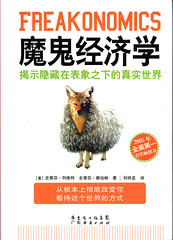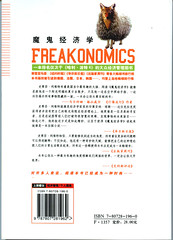Freakonomics in Chinese
Last night while on an evening stroll around Zhongshan Park I was surprised to discover that the pirated book man (he pushes his goods around in a big cart) had a copy of the Chinese version of Freakonomics.
The book was good quality, except for the occasional misalligned printing which plagues pirated books. The cover certainly looks fine, although I was disappointed to see the trademark apple/orange image (see the book’s own website if you’re unfamiliar with the book) replaced by the lame wolf/sheep image. Why would they do that?
The other thing is the name. The translator chose to represent Freakonomics, a blend of the words “freak” and “economics” as 魔鬼经济学, which literally means “devil economics.” OK, so the name Freakonomics is hard to translate, but “devil economics?” Yet another translation challenge unmet. Maybe 惊济学?



惊济学? I love it. It definitely conveys what “freakonomics” is about better than “devil economics” does to me as a non-native speaker.
Well, the wolf is dressed up as a sheep. If they translated the title as “Devil Economics” then I gather they are positioning the book as one that deals with economic’s hidden evils, i.e. economics as a (predatory) wolf disguised as a (gentle, harmless) sheep.
Of course, this interpretation is entirely from my Western point of view. I have no idea if the sheep (lamb) – wolf symbolism exists in Chinese culture.
Katja,
But that’s not what the book is about at all.
By the way, that’s a FOX not a wolf on the cover.
Interesting. Though the piracy aspect is not a good thing, it is a good thing this book is getting out. It is the probing, critical, liberal arts education the Chinese never really get.
Good work, John. As a Chinese, i think 惊济学 is definitely better than 魔鬼经济学 as it captures the essence of the English title. Not surprisingly, Chinese always translates movie/book title badly. For example, for movie “The Day After Tomorrow”, in Taiwan it’s called 明天以后, but in China, it’s 后天. And what is “Top Gun” called for Chinese people? 好大一支枪
Um… I agree that 惊济学 is very clever and all. Trouble is, when people actually talk about the book, it will sound exactly like 经济学, which sucks. It’s pretty much equivalent to calling a book “Economix” in English:
A: “Hey, have you read that book, Economix?”
B: “What, you mean like a high school textbook or something?”
A: “No, no…. See, it’s like economics, except with it’s mix, m-i-x, instead of … [boring explanation].”
So although 惊济学 is pretty cool in written form, it’s not very catchy, and requires an explanation every time you talk about it, otherwise to most people you’re just saying “economics”. Unlike Freakonomics, which has a distinct ptronunciation. In that sense, 魔鬼经济学, though certainly not perfect, does have the originality/weirdness that the English title had. It’s all about word of mouth marketing…
Plus, discussing the book in an intelligent manner (say, in academic circles) would be next to impossible, because you’d have two words with a different but closely related meaning with the exact same pronunciation:
A: 哎呀! 不是经济学, 是惊济学!
When you want to coin a new term, it’s probably wise not to choose an exact synonym of a word that already exists in the same discipline. Just my two cents…
FYI:
Japanese version
Oops… In that last sentence I mean to write “homophone” and not “synonym”. Sorry about that…
Here’s what the author, himself, says about the Chinese translation:
“I am told that the title of the book is “Devil’s Economics” in Chinese. I kind of like that!”
http://www.freakonomics.com/blog/2006/05/06/the-devil-in-the-pulpit/
tek.
The devil is a trickster, I like the real fake title! And the wolf in sheep clothing thing is Chinese as well as English…yeah the two together give an impression of something dangerous, but the contents are hardly a diatribe about the evils of economic analysis.
Having read the book recently (a bootleg of the book, but in English), I was very dissappointed. I recall it as a very interestesting New York Times Magazine article, it was then padded with a bunch of BS and stuff that wasn’t even true – the idea that Superman scriptwriters took down the KKK, for instance.
Oh, I did not mean to imply that this is what the book is ACTUALLY about.
It’s not unusual that cover illustrations imply the book is about one thing and then it turns out to be about something completely different. Ditto for “translations” of book titles. While I cannot speak for the Chinese book market, I have seen this with Persian and Arabic translations of books (and of course the same goes for English translations of Arabic or Persian books). Not infrequently books get “appropriated” by other cultures and become embedded in rather different discourses. Even if the content remains largely the same, it is fed into a different “conversation”.
Of course I am just speculating here. But since you were stumped, I thought I would throw it out there.
I guess only way to confirm or discount this guess is to ask Chinese colleagues and friends. I’d be curious to hear their take on the cover and their readings of the book.
Oh. It IS a fox! My fault for not wearing glasses and enlarging the picture when looking at this. Well the wolf – sheep thing would have been too neat.
Money: Thanks for that explanation. A while back I was reading a transcript of a talk show from Taiwan where guests were discussing differences between the mainland and the island, and used the “Day after tomorrow” example. Only it wasn’t identified as the movie – so I, and lots of forum commenters, were under the impression that Taiwanese actually say 明天以后 instead of 后天 on a regular basis….seems so obvious, now.
It looks more coyote than wolf and fox…
惊济学 is really fantastic name of the book.Actually, I think many translations in chinese is really successful. “gone with the wind” 飘。waterloo bridge 魂断蓝桥。Chinese is a coverall language.some times you will feel it beautiful.
I agree Jeff. All I took away from the book was the premise that moralists study the way the world should work and economists study the way the world actually does work. It’s a much broader view of economics than I was used to. But the book itself was pretty worthless.
damao,
Upon first reading your comment, I thought you had a good point and I agreed. After thinking about it some more, though, I think that 惊济学 would work. Why? Because when people said 惊济学 they would not say it the same way they would say 经济学–they would pause slightly before saying it, kind of like when we verbally add “quotation marks” to words in our speech. This slight pause would clue the listener in that something was up, causing him to either (a) realize the speaker was referring to 惊济学 if he knew of the book, or (b) realize that it wasn’t just a typical textbook on economics.
I think there would be a little bit of the effect you describe, but not so much that it would be a problem, and it wouldn’t cause more of a problen than a misleading translation of the title.
Nobu,
Thanks for the link; that’s really cool! I think the Japanese translation is better than the Chinese translation, but it still has that “danger” element, similar to 魔鬼. I guess it’s just what Katja hints at–using a certain kind of translation to better appeal to the target audience. (Asians like danger!)
Tek,
Thanks for that link! I didn’t think to check the authors’ blog. Interesting…
惊济学? Economix? It’s too much of a crazy mix and match of meaning components for me… too much of a signosplice.
I have a headache. I’m going now.
I like your alternate translation, John.
I think the title Mogui Jingji is a reference to “The Devil’s Dictionary” by Ambrose Bierce, which was popular in China a decade back and known as Mogui Zidian. So any title beginning with Mogui now suggests to the Chinese reader that the book will be light, amusing, irreverent and iconoclastic. Perfect for Freakonomics.
Traveller,
Thanks, that does make sense.
Still, though, in the case of “The Devil’s Dictionary,” at least the word ‘devil’ was in the title! It’s best not to invent references if you don’t have to.
惊济学 is a wonderful name! But 魔鬼经济学 is ok,too.Both are attractive but the latter can be more easily understood.Maybe less people who don’t care about economics don’t know what is 惊济学 about, but they will know that 魔鬼经济学 is something about economics. Maybe 惊济学 is a better name for us who study economics:D
Turns out that for the Taiwan/Hong Kong edition (not sure which), not only did the publishers preserve the “trademark apple/orange image,” but they used it for a title, too: 苹果橘子经济学.